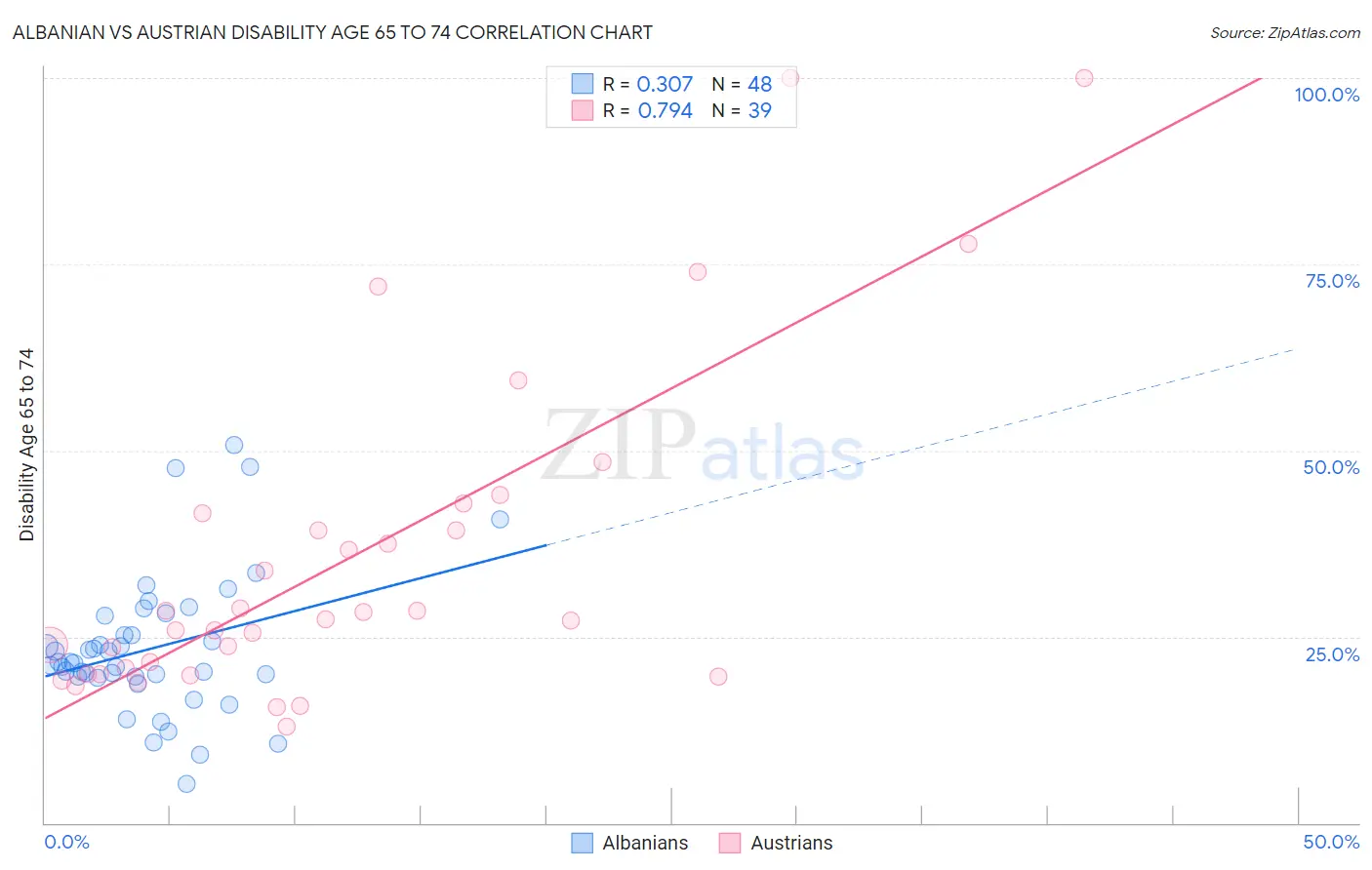Albanian vs Austrian Disability Age 65 to 74
COMPARE
Albanian
Austrian
Disability Age 65 to 74
Disability Age 65 to 74 Comparison
Albanians
Austrians
22.3%
DISABILITY AGE 65 TO 74
95.8/ 100
METRIC RATING
109th/ 347
METRIC RANK
22.4%
DISABILITY AGE 65 TO 74
94.7/ 100
METRIC RATING
118th/ 347
METRIC RANK
Albanian vs Austrian Disability Age 65 to 74 Correlation Chart
The statistical analysis conducted on geographies consisting of 193,041,250 people shows a mild positive correlation between the proportion of Albanians and percentage of population with a disability between the ages 65 and 75 in the United States with a correlation coefficient (R) of 0.307 and weighted average of 22.3%. Similarly, the statistical analysis conducted on geographies consisting of 451,186,981 people shows a strong positive correlation between the proportion of Austrians and percentage of population with a disability between the ages 65 and 75 in the United States with a correlation coefficient (R) of 0.794 and weighted average of 22.4%, a difference of 0.38%.

Disability Age 65 to 74 Correlation Summary
| Measurement | Albanian | Austrian |
| Minimum | 5.2% | 13.0% |
| Maximum | 50.8% | 100.0% |
| Range | 45.6% | 87.0% |
| Mean | 23.3% | 35.5% |
| Median | 21.5% | 27.3% |
| Interquartile 25% (IQ1) | 19.6% | 19.9% |
| Interquartile 75% (IQ3) | 26.5% | 41.5% |
| Interquartile Range (IQR) | 6.9% | 21.6% |
| Standard Deviation (Sample) | 9.3% | 22.0% |
| Standard Deviation (Population) | 9.2% | 21.7% |
Demographics Similar to Albanians and Austrians by Disability Age 65 to 74
In terms of disability age 65 to 74, the demographic groups most similar to Albanians are Immigrants from Peru (22.3%, a difference of 0.050%), Serbian (22.3%, a difference of 0.070%), Immigrants from Zimbabwe (22.3%, a difference of 0.090%), Slovene (22.2%, a difference of 0.10%), and Peruvian (22.2%, a difference of 0.11%). Similarly, the demographic groups most similar to Austrians are Swedish (22.4%, a difference of 0.0%), Immigrants from Northern Africa (22.4%, a difference of 0.010%), Brazilian (22.4%, a difference of 0.020%), Laotian (22.3%, a difference of 0.060%), and Ukrainian (22.3%, a difference of 0.12%).
| Demographics | Rating | Rank | Disability Age 65 to 74 |
| South Americans | 96.4 /100 | #103 | Exceptional 22.2% |
| Colombians | 96.4 /100 | #104 | Exceptional 22.2% |
| Palestinians | 96.3 /100 | #105 | Exceptional 22.2% |
| Peruvians | 96.1 /100 | #106 | Exceptional 22.2% |
| Slovenes | 96.1 /100 | #107 | Exceptional 22.2% |
| Immigrants | Zimbabwe | 96.1 /100 | #108 | Exceptional 22.3% |
| Albanians | 95.8 /100 | #109 | Exceptional 22.3% |
| Immigrants | Peru | 95.7 /100 | #110 | Exceptional 22.3% |
| Serbians | 95.7 /100 | #111 | Exceptional 22.3% |
| Immigrants | South America | 95.5 /100 | #112 | Exceptional 22.3% |
| Syrians | 95.3 /100 | #113 | Exceptional 22.3% |
| Ukrainians | 95.1 /100 | #114 | Exceptional 22.3% |
| Laotians | 94.9 /100 | #115 | Exceptional 22.3% |
| Brazilians | 94.8 /100 | #116 | Exceptional 22.4% |
| Swedes | 94.7 /100 | #117 | Exceptional 22.4% |
| Austrians | 94.7 /100 | #118 | Exceptional 22.4% |
| Immigrants | Northern Africa | 94.7 /100 | #119 | Exceptional 22.4% |
| Immigrants | Kazakhstan | 93.9 /100 | #120 | Exceptional 22.4% |
| Czechs | 93.5 /100 | #121 | Exceptional 22.4% |
| Immigrants | Jordan | 93.5 /100 | #122 | Exceptional 22.4% |
| Hungarians | 93.3 /100 | #123 | Exceptional 22.4% |